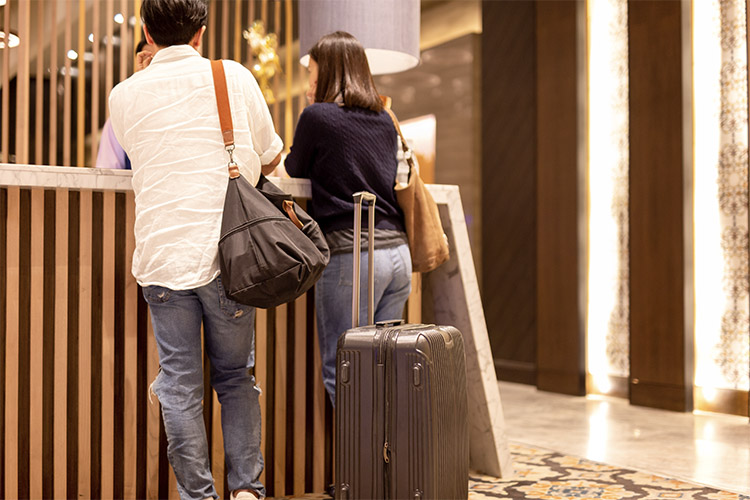Airbnb: Market Share Monster
[vc_row][vc_column][vc_message css_animation=”fadeInDown”]
Special Report:
This exclusive content is reprinted from the Source Strategies Hotel Brand Report issue #145 (First Quarter 2021). The Hotel Brand Report is published quarterly and contains a full recap of quarterly results, a breakdown of the industry by Texas metro and product segment, complete brand performance stats, as well as the top 500 Texas hotels of the quarter by REVPAR.[/vc_message][vc_column_text]
 By Stanton Leddy, CEO at Source Strategies
By Stanton Leddy, CEO at Source Strategies
The news has been bleak. Our own headlines from Source Strategies have read:
- Second Quarter Revenue Plummets 64% – Steepest Decline On Record
- Revenues Bounce Back Slightly But Losses Remain Historically Dire
- Fourth Quarter Revenues Drop 41.6% Concluding A Devastating Year For The Texas Hospitality Sector.
Not exactly the type of year we will look back on fondly.
However, based on First Quarter 2021, Airbnb could point to the pandemic as the starting point of exponential growth. While the rest of the state has largely suffered, Airbnb has increased its revenue and market share.
| Airbnb |
2019 – Q1 |
2020 – Q1 |
2021 – Q1 |
| Room Revenue |
130,072 |
108,031 |
178,154 |
| % Chg |
55.8% |
(16.9%) |
64.9% |
| % of Texas Revenue |
4.3% |
4.3% |
8.6% |
As you can see, 2021 has seemingly started with no lasting impact from the Covid-19 pandemic. Revenue has actually grown by $48M or 37% from 2019, more than making up for the loss in 2020. This all seems impossible in a state that experienced a $1B decline in lodging revenue from 2019.
| Texas – All Lodging |
2019 – Q1 |
2020 – Q1 |
2021 – Q1 |
| Room Revenue |
3,047,353 |
2,552,881 |
2,078,226 |
| % Chg |
3.3% |
(16.2%) |
(18.6%) |
| % Chg (No Airbnb) |
1.7% |
(16.1%) |
(22.3%) |
Airbnb’s year-over-year improvement has been driven by market share rather than the proverbial rising tide. The percent of Airbnb’s Texas lodging revenue has doubled from 4.3% to 8.6%, an unprecedented spike for any brand or market segment. The reasons are multiple:
- Leisure Travel (especially to destinations) has returned much more than Business Travel.
- Additional supply of “host” locations.
- Desire for unique experiences, especially amongst Millenials.
- Established trust and acceptance as an alternative lodging option.
- Labor not a factor in potential growth.
- Less regulation/ease of entry
The first two bullets are the biggest risk to maintaining this new-found market share. As the more traditional traveler returns, they will likely opt for the predictable brands they have historically used. There is also the constraint of not enough Airbnb hosts being available to satisfy demand. Even if the traveler wants to stay with Airbnb, they may not find a location that suits their needs.
| Airbnb/VRBO |
2019 – March |
2020 – March |
2021 – March |
| Number of Hosts |
54,102 |
66,376 |
70,100 |
| New Hosts |
9,907 |
12,274 |
3,724 |
| % Chg |
22.4% |
22.7% |
5.6% |
Source: AirDNA
Per AirDNA, approximately 14,000 new worldwide hosts join Airbnb every month, annualized to about a 6% growth in supply. Texas has averaged around 670 new hosts per month or 9% annual growth in supply. This is well short of the compounded 17% revenue increase that Texas has experienced since 2019. A simple assumption could be made that this growth is unsustainable even with unlimited available hosts; however, the growing pool of Millenials and trust in the platform could sustain the trajectory. Additionally, the necessity of contactless alternative lodging due to the Covid-19 pandemic has accelerated brand awareness to a point that it is no longer a tertiary option.
The other great advantage for Airbnb is imperviousness to labor shortages. Many hotels are struggling with rehiring employees, resulting in operating at less-than-full capacity. Most Airbnbs are operated and maintained by the hosts, meaning they are free to monetize their property without fear of service disruption or reduced guest experience. If hiring doesn’t improve heading into the busy summer season, this could play a serious part in hotel room availability and Airbnb stands to capitalize.
As for where the greatest Texas Airbnb activity has occurred, the table below provides the top 20 cities with the highest revenue change since 2019 (sorted by revenue dollar change versus 1Q 2019):
Airbnb Revenue Change cities since 2019 (sorted by revenue dollar change versus 1Q 2019
| City | Metro |
1Q 2021 Revenue |
$ Chg vs 1Q 2019 |
% Chg vs 1Q 2019 |
| GALVESTON | HOUSTON |
$14,336,909 |
$7,093,177 |
97.9% |
| HOUSTON | HOUSTON |
$21,628,123 |
$7,074,264 |
48.6% |
| DALLAS | DALLAS |
$15,489,763 |
$3,406,652 |
28.2% |
| PORT ARANSAS | CORPUS CHRISTI |
$4,674,371 |
$2,420,324 |
107.4% |
| CORPUS CHRISTI | CORPUS CHRISTI |
$5,286,416 |
$2,333,358 |
79.0% |
| EL PASO | EL PASO |
$3,324,969 |
$2,042,864 |
159.3% |
| FORT WORTH | FORT WORTH |
$4,331,471 |
$1,856,280 |
75.0% |
| SOUTH PADRE ISL | BROWNSVILLE |
$6,004,154 |
$1,732,709 |
40.6% |
| FREDERICKSBURG |
$4,217,217 |
$1,539,785 |
57.5% |
|
| SAN ANTONIO | SAN ANTONIO |
$10,809,487 |
$1,298,866 |
13.7% |
| WACO | WACO |
$2,708,075 |
$1,241,871 |
84.7% |
| SURFSIDE BEACH | HOUSTON |
$1,696,743 |
$1,135,855 |
202.5% |
| PLANO | DALLAS |
$2,196,519 |
$1,005,870 |
84.5% |
| ROCKPORT | CORPUS CHRISTI |
$1,344,284 |
$814,200 |
153.6% |
| AMARILLO | AMARILLO |
$1,351,141 |
$811,465 |
150.4% |
| LAGO VISTA | AUSTIN |
$1,114,187 |
$698,121 |
167.8% |
| GRAND PRAIRIE | DALLAS |
$894,852 |
$622,599 |
228.7% |
| LUBBOCK | LUBBOCK |
$1,393,679 |
$560,817 |
67.3% |
| MCKINNEY | DALLAS |
$925,163 |
$543,593 |
142.5% |
| WIMBERLEY | AUSTIN |
$1,038,414 |
$542,434 |
109.4% |
While there has been continued adoption of Airbnb as a viable alternative in smaller markets, even the major metros experienced large Airbnb growth. These same markets were especially impacted by Covid-19, with traditional hotels averaging a 40% revenue loss from 2019 levels.
Ultimately, it is increasingly clear that Airbnb and similar options will not be going away anytime soon. In fact, they are establishing a greater foothold in the market (8.6% of Texas room revenue in First Quarter 2021) as traditional lodging struggles to cope with the post-pandemic travel environment. If Airbnb can continue to attract new hosts at a sufficient rate to satisfy demand, there really is no limit to the growth potential.
Once thought of as a curiosity, Airbnb must now be taken seriously as a competitor by hoteliers.
[/vc_column_text][/vc_column][/vc_row]
Source Strategies Hospitality Industry News

The latest developments from Source Strategies about the Texas Hospitality Industry.


